James Branch Cabell

James Branch Cabell (14 April 1879 – 5 May 1958) was an American author of satirical fantasy works, most notably The Cream of the Jest, Jurgen, A Comedy of Justice, Figures of Earth, and other works in the series known as Biography of the Life of Manuel.
Quotes[edit]

Why should we hope to know of Something higher?



- Men have begun to observe and classify, they turn from creation to Criticism. ... It is the Fashion to be a wit. ... one must be able to conceal indecency with elegant diction; manners are everything, morals nothing.
- "The Comedies of William Congreve" in William and Mary College Monthly (September 1897), V, p. 41, as quoted in "James Branch Cabell at William and Mary: the Education of a Novelist," by William L. Godshalk in The William and Mary Review, 5 (1967); reprinted in Kalki, Vol II, No.4, Whole No.8 (1968)
- Nay, 'tis not fitting that we should require
Within this World but Raiment, Food and Fire;
Powerless Atoms of Eternity
Why should we hope to know of Something higher?This Knowledge could but add, not lessen. Woe;
The Magian who To-day forms fire with snow
Shares with the Sudra in Infinity.
We come from Nothing and to Nothing go.So best consent, although with forced grace,
Upon this dingy Ball to run our race
Untrammeled with the thoughts of higher things,
Until we reach the shadowy Stopping place.- Quotes from "The Blind Desire", using the pseudonym "Charles A. Ballance" in William and Mary College Monthly (September 1897), V, p. 51
- A novel, or indeed any work of art, is not intended to be a literal transcription from Nature. ... Life is a series of false values. There it is always the little things that are greatest. Art attempts to remedy this. It may be defined as an expurgated edition of Nature.
- Writing on Charles Dickens, in "In Defence of an Obsolete Author" in William and Mary College Monthly (November 1897), VII, p. 3-4
- If we assiduously cultivate our powers of exaggeration, perhaps we, too, shall obtain the Paradise of Liars. And there Raphael shall paint for us scores and scores of his manifestly impossible pictures ... and Shakespeare will lie to us of fabulous islands far past 'the still-vex'd Bermoothes,' and bring us fresh tales from the coast of Bohemia. For no one will speak the truth there, and we shall all be perfectly happy.
- "On Telling the Truth" in William and Mary College Monthly (November 1897), VII, p. 53-55
- While it is well enough to leave footprints on the sands of time, it is even more important to make sure they point in a commendable direction.
- Beyond Life (1919) Ch. VI : Which Values the Candle, § 2, p. 173
- I have read that the secret of gallantry is to accept the pleasures of life leisurely, and its inconveniences with a shrug; as well as that, among other requisites, the gallant person will always consider the world with a smile of toleration, and his own doings with a smile of honest amusement, and Heaven with a smile which is not distrustful — being thoroughly persuaded that God is kindlier than the genteel would regard as rational.
- As quoted in in Contemporary American Novelists, 1900-1920 (1922) by Carl Clinton Van Doren
- The comedy is always the same. In the first act the hero imagines a place where happiness exists. In the second he strives towards that goal. In the third he comes up short or what amounts to the same thing he achieves his goal only to find that happiness lies a little further down the road.
- Horvendile, in The High Place : A Comedy of Disenchantment (1923), Ch. XVI: Some Victims of Flamberge.
- Yet this Charteris speaks from a perished world, he babbles of a civilization as dead as Babylon's... [In 1918, for example,] Woodrow Wilson was filling, accurately, the former station of William McKinley and of James K. Polk; and in many quarters was being taken quite as seriously as had been his predecessors during their own personally directed wars for moral principles so consistently elevated that they have never yet sunk into human comprehension.
- Beyond Life (1919; 1927 edition), Author's Note
- A book, once it is printed and published, becomes individual. It is by its publication as decisively severed from its author as in parturition a child is cut off from its parent. The book "means" thereafter, perforce, — both grammatically and actually, — whatever meaning this or that reader gets out of it.
- "A Note on Cabellian Harmonics" in Cabellian Harmonics (April 1928)
- Tell the rabble my name is Cabell.
- A rhyme he made to indicate the proper pronunciation of his name, as quoted in The Reader's Encyclopedia of American Literature (1962) edited by Max J. Herzburg, p. 132
The Certain Hour (1916)[edit]


Whereby decays
Each thing save one thing: — mid this strife diurnal
Of hourly change begot,
Love that is God-born, bides as God eternal,
And changes not...

They have linked with another whom omens bother; and he whispers in one's ear.
And one is fain to be climbing where only angels have trod,
But is fettered and tied to another's side who fears that it might look odd.


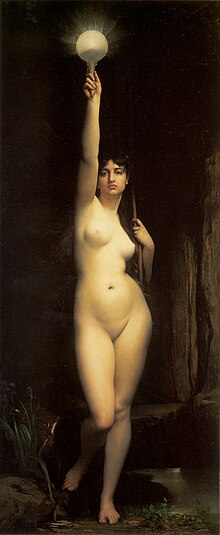
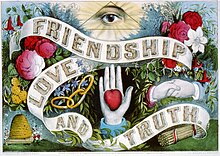

- Criticism, whatever may be its pretensions, never does more than to define the impression which is made upon it at a certain moment by a work wherein the writer himself noted the impression of the world which he received at a certain hour.
- Epigraph
- Sad hours and glad hours, and all hours, pass over;
One thing unshaken stays:
Life, that hath Death for spouse, hath Chance for lover;
Whereby decays
Each thing save one thing: — mid this strife diurnal
Of hourly change begot,
Love that is God-born, bides as God eternal,
And changes not; —Nor means a tinseled dream pursuing lovers
Find altered by-and-bye,
When, with possession, time anon discovers
Trapped dreams must die, —
For he that visions God, of mankind gathers
One manlike trait alone,
And reverently imputes to Him a father's
Love for his son.- "To Robert Gamble Cabell II: In Dedication of The Certain Hour"
- The Terrible and Marvellous History of Manuel Pig-Tender That Afterwards Was Named Manuel the Redeemer.
- Title of a fictional work that he "quotes" from at the start of the book.
- In the beginning the Gods made man, and fashioned the sky and the sea,
And the earth's fair face for man's dwelling-place, and this was the Gods' decree: —"Lo, We have given to man five wits: he discerneth folly and sin;
He is swift to deride all the world outside, and blind to the world within:
So that man may make sport and amuse Us, in battling for phrases or pelf,
Now that each may know what forebodeth woe to his neighbor, and not to himself."- "Ballad of the Double-Soul"
- For this is the song of the double-soul, distortedly two in one, —
Of the wearied eyes that still behold the fruit ere the seed be sown,
And derive affright for the nearing night from the light of the noontide sun.
For one that with hope in the morning set forth, and knew never a fear,
They have linked with another whom omens bother; and he whispers in one's ear.
And one is fain to be climbing where only angels have trod,
But is fettered and tied to another's side who fears that it might look odd.- "Ballad of the Double-Soul"
- And one would worship a woman whom all perfections dower,
But the other smiles at transparent wiles; and he quotes from Schopenhauer.Thus two by two we wrangle and blunder about the earth,
And that body we share we may not spare; but the Gods have need of mirth.- "Ballad of the Double-Soul"
- From the dawn of the day to the dusk he toiled,
Shaping fanciful playthings, with tireless hands, —
Useless trumpery toys; and, with vaulting heart,
Gave them unto all peoples, who mocked at him,
Trampled on them, and soiled them, and went their way.- "Auctorial Induction"
- Thus he labors, and loudly they jeer at him; — That is, when they remember he still exists.
Who. you ask, is this fellow? — What matter names?
He is only a scribbler who is content.- "Auctorial Induction"
- The desire to write perfectly of beautiful happenings is, as the saying runs, old as the hills — and as immortal.
- "Auctorial Induction"
- Some few there must be in every age and every land of whom life claims nothing very insistently save that they write perfectly of beautiful happenings.
- "Auctorial Induction"
- A man of genuine literary genius, since he possesses a temperament whose susceptibilities are of wider area than those of any other, is inevitably of all people the one most variously affected by his surroundings. And it is he, in consequence, who of all people most faithfully and compactly exhibits the impress of his times and his times' tendencies, not merely in his writings — where it conceivably might be just predetermined affectation — but in his personality.
- "Auctorial Induction"
- Always the fact remains that to the mentally indolent this book may well seem a volume of disconnected short stories. All of us being more or less mentally indolent, this possibility constitutes a dire fault.
- "Auctorial Induction"
- At what cost, now, may one attempt to write perfectly of beautiful happenings?
- "Auctorial Induction"
- It spurred me to such action as I took, — but it has robbed me of sugared eloquence, it has left me chary of speech. It is necessary that I climb very high because of my love for you, and upon the heights there is silence.
- "Auctorial Induction"
- Time changes all things and cultivates even in herself an appreciation of irony, — and, therefore, why shouldn't I have changed a trifle?
- "Auctorial Induction"
- Oh, do the Overlords of Life and Death always provide some obstacle to prevent what all of us have known in youth was possible from ever coming true?"
- "Auctorial Induction"
- I have made at worst some neat, precise and joyous little tales which prevaricate tenderly about the universe and veil the pettiness of human nature with screens of verbal jewelwork. It is not the actual world they tell about, but a vastly superior place where the Dream is realized and everything which in youth we knew was possible comes true. It is a world we have all glimpsed, just once, and have not ever entered, and have not ever forgotten. So people like my little tales. . . . Do they induce delusions? Oh, well, you must give people what they want, and literature is a vast bazaar where customers come to purchase everything except mirrors."
- "Auctorial Induction"
- I was born, I think, with the desire to make beautiful books — brave books that would preserve the glories of the Dream untarnished, and would re-create them for battered people, and re-awaken joy and magnanimity.
- "Auctorial Induction"
- The Dream, as I now know, is not best served by making parodies of it, and it does not greatly matter after all whether a book be an epic or a directory. What really matters is that there is so much faith and love and kindliness which we can share with and provoke in others, and that by cleanly, simple, generous living we approach perfection in the highest and most lovely of all arts. . . . But you, I think, have always comprehended this.
- "Auctorial Induction"
- Hey, my masters, lords and brothers, ye that till the fields of rhyme,
Are ye deaf ye will not hearken to the clamor of your time?- "Auctorial Induction"
- We are talking over telephones, as Shakespeare could not talk;
We are riding out in motor-cars where Homer had to walk;
And pictures Dante labored on of mediaeval Hell
The nearest cinematograph paints quicker, and as well.But ye copy, copy always; — and ye marvel when ye find
This new beauty, that new meaning, — while a model stands behind,
Waiting, young and fair as ever, till some singer turn and trace
Something of the deathless wonder of life lived in any place.
Hey, my masters, turn from piddling to the turmoil and the strife!
Cease from sonneting, my brothers; let us fashion songs from life.- "Auctorial Induction"
The Cream of the Jest (1917)[edit]

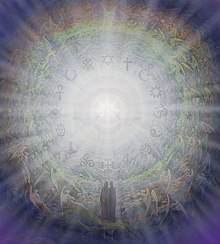

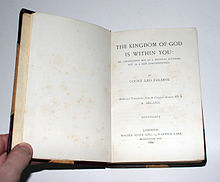


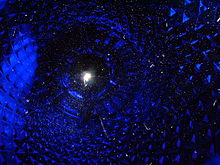


- The Cream of the Jest : A Comedy of Evasions (1917) - full text online; This section also Includes some quotes from the Author's note to the edition of 1929
- American literature was enriched with Men Who Loved Allison.... Of the actual and eventual worth of this romance I cannot pretend to be an unprejudiced judge. The tale seems to me one of those many books which have profited, very dubiously indeed, by having obtained, in one way of another, the repute of being indecent.
- Author's Note (1929 edition)
- Before 1914 had well begun to make the world safe for hypocrisy, these stories had blended into one continuous and fairly long Comedy of Evasion, called then In the Flesh, but a little later rechristened The Cream of The Jest...
- Author's Note (1929 edition)
- This book did not get for me any general recognition. It got for me, instead, something in every way more valuable. For it was The Cream of the Jest which first made for me in the seventeenth year of my writing, a few warm friends who but a little later were to fight in my behalf very nobly, and with wholly heroic tenacity... If few writers have met with more smug, more prurient, or more disingenuous opponents, no writer whatever, I think has found more faithful allies.
- Author's Note (1929 edition)
- Kennaston no longer thought of himself as a man of flesh-and-blood moving about a world of his compeers. Or, at least, that especial aspect of his existence was to him no longer a phase of any particular importance.
- "Richard Fentnor Harroby" in Ch. 1 : Pallation of the Gambit
- You must permit that I begin it in my own way, with what may to you at first seem dream-stuff. For I commence at Storisende, in the world's youth, when the fourth Count Emmerick reigned in Poictesme, having not yet blundered into the disfavor of his papal cousin Adrian VII.... With such roundabout gambits alone can some of us approach — as one fancy begets another, if you will — to proud assurance that life is not blind and aimless business; not all a hopeless waste and confusion; and that we ourselves may (by and by) be strong and excellent and wise.
- "Richard Fentnor Harroby" in Ch. 1 : Pallation of the Gambit
- I also begin where he began, and follow wither the dream led him. Meanwhile, I can but entreat you to remember it is only by preserving faith in human dreams that we may, after all, perhaps some day make them come true.
- "Richard Fentnor Harroby" in Ch. 1 : Pallation of the Gambit
- Love, I take it, must look toward something not quite accessible, something not quite understood.
- Horvendile, in Ch. 2 : Introduces the Ageless Woman
- You embody all that I was ever able to conceive of beauty and fearlessness and strange purity. Therefore it is evident I do not see in you merely Count Emmerick's third sister, but, instead, that ageless lovable and loving woman long worshipped and sought everywhere in vain by all poets.
- Horvendile, to Ettarre in Ch. 2 : Introduces the Ageless Woman
- You touch on a disheartening truth. People never want to be told anything they do not believe already.
- Ch. 13 : Suggesting Themes of Universal Appeal
- There are many of our so-called captains on industry who, if the truth were told, and a shorter and uglier word were not unpermissible, are little better than malefactors of great wealth.
- Ch. 14 : Peculiar Conduct of a Personage
- Whatever pretended pessimists in search of notoriety may say, most people are naturally kind, at heart.
- Ch. 14 : Peculiar Conduct of a Personage
- Dreaming a dream to prize,
Is wishing ghosts to rise;
And, if I had the spell
To call the buried — well,
Which one would I?- Epigraph to "Book Four : Which Travels, roundabout, to edifying and safe conclusions"
- It was not his to choose from what volume or on which page thereof he would read; accident, as it seemed, decided that; but the chance-opened page lay unblurred before him, and he saw it with a clarity denied to other men of his generation.
- Ch. 23 : Economic Considerations of Piety
- With the passage of time, whatever a man had done, whether for good or evil, with the man's bodily organs, left the man's parish unaffected: only a man's thoughts and dreams could outlive him, in any serious sense, and these might survive with perhaps augmenting influence: so that Kennaston had come to think artistic creation in words — since marble and canvas inevitably perished — was the one, possibly, worth-while employment of human life. But here was a crude corporal deed which bluntly destroyed thoughts, and annihilated dreams by wholesale. To Kennaston this seemed the one real tragedy that could be staged on earth....
- Ch. 24 : Deals with Pen Scratches
- Here was the astounding fact: the race did go forward; the race did achieve; and in every way the race grew better. Progress through irrational and astounding blunders, whose outrageousness bedwarfed the wildest cliches of romance, was what Kennaston found everywhere. All this, then, also was foreplanned, just as all happenings at Storisende had been, in his puny romance; and the puppets, here to, moved as they thought of their own volition, but really in order to serve a denouement in which many of them had not any personal part or interest....
- Ch. 26 : "Epper Si Muove" [this chapter title is derived from a purported comment of Galileo: Eppur Si Muove "And yet it moves."]
- "Why is a Kennaston?" he asked himself — thus whimisically voicing a real desire to know if human beings were intended for any especial purpose. Most of us find it more comfortable, upon the whole, to stave off such queries — with a jest, a shrug, or a Scriptural quotation, as best suits personal taste; but Kennaston was "queer" enough to face the situation quite gravely.
- Ch. 26 : "Epper Si Muove"
- Religion, of course, assured him that the answer to his query was, in various books, explicitly written, in very dissimilar forms. But Kennaston could find little to attract him in any theory of the universe based upon direct revelations from heaven. Conceding that divinity had actually stated so-and-so, from Sinai or Delphi or Mecca, and had been reported without miscomprehension or error, there was no particular reason for presuming that divinity had spoken veraciously: and, indeed all a available analogues went to show that nothing in nature dealt with its inferiors candidly.
- Ch. 26 : "Epper Si Muove"
- To-day alone was real. Never was man brought into contact with reality save through the evanescent emotions and sensations of that single moment, that infinitesimal fraction of a second, which was passing now — and it was in the insignificance of this moment, precisely, that religious persons must believe. So ran the teachings of all dead and lingering faiths alike. Here was, perhaps, only another instance of mankind's abhorrence of actualities; and man's quaint dislike of facing reality was here disguised as a high moral principle. That was why all art, which strove to make the sensations of a moment soul-satisfying, was dimly felt to be irreligious. For art performed what religion only promised.
- Ch. 26 : "Epper Si Muove"
- Kennaston could find in the past — even he, who was privileged to view the past in its actuality, rather than through the distorting media of books and national pride — no suggestion as to what, if anything, he was expected to do while his physical life lasted, or to what, if anything, this life was a prelude. Yet that to-day was only a dull overture to to-morrow seemed in mankind an instinctive belief. All life everywhere, as all people spent it, was in preparation for something that was to happen to-morrow.
- Ch. 27 : Evolution of a Vestryman
- The transfiguring touch was to come, it seemed from a girl's lips; but it had not; he kissed, and life remained uncharmed. ...at the bottom of his heart, he was still expecting the transfiguring touch to come, some day, from something he was to obtain or do, perhaps to-morrow.... Then he had by accident found out the sigil's power...
- Ch. 27 : Evolution of a Vestryman
- The purblind majority quite honestly believed that literature was meant to mimic human life, and that it did so. And in consequence, their love-affairs, their maxims, their so-called natural ties and instincts, and above all, their wickedness, became just so many bungling plagiarisms from something they had read, in a novel or a Bible or a poem or a newspaper. People progressed from the kindergarten to the cemetery assuming that their emotion at every crisis was what books taught them was the appropriate emotion, and without noticing that it was in reality something quite different. Human life was a distorting tarnished mirror held up to literature: this much at least of Wilde's old paradox — that life mimicked art — was indisputable. Human life, very clumsily, tried to reproduce the printed word.
- Ch. 27 : Evolution of a Vestryman
- I quite fixedly believe the Wardens of Earth sometimes unbar strange windows, that face on other worlds than ours. And some of us, I think, once in a while get a peep through these windows. But we are not permitted to get a long peep, or an unobstructed peep, nor very certainly, are we permitted to see all there is — out yonder. The fatal fault, sir, of your theorizing is that it is too complete. It aims to throw light upon the universe, and therefore is self-evidently moonshine. The Wardens of Earth do not desire that we should understand the universe, Mr. Kennaston; it is part of Their appointed task to insure that we never do; and because of Their efficiency every notion that any man, dead, living, or unborn, might form as to the universe will necessarily prove wrong.
- Ch 28 : The Shallowest Sort of Mysticism
- I have been telling you, from alpha to omega, what is the one great thing the sigil taught me — that everything in life is miraculous. For the sigil taught me that it rests within the power of each of us to awaken at will from a dragging nightmare of life made up of unimportant tasks and tedious useless little habits, to see life as it really is, and to rejoice in its exquisite wonderfulness. If the sigil were proved to be the top of a tomato-can, it would not alter that big fact, nor my fixed faith. No Harrowby, the common names we call things by do not matter — except to show how very dull we are...
- The Epilogue : Which is the proper ending of all comedies; and heralds, it may be, an afterpiece.
- The Wardens of Earth sometimes unbar strange windows, I suspect — windows which face on other worlds than ours: and They permit this-or-that man to peer out fleetingly, perhaps, just for the joke's sake; since always They humorously contrive matters so this man shall never be able to convince his fellows of what he has seen or of the fact that he was granted any peep at all. The Wardens without fail arrange what we call — gravely, too — "some natural explanation."
- Ch. 40 : Which Mr. Flaherty Does Not Quite Explain
- The man was not merely very human; he was humanity. And I reflected that it is only by preserving faith in human dreams that we may, after all, perhaps some day make them come true.
- Ch. 40 : Which Mr. Flaherty Does Not Quite Explain
- Whatever there is to know,
That shall we know one day.- Epigraph to "The Epilogue : Which is the proper ending of all comedies; and heralds, it may be, an afterpiece."
- It is true I have not told you everything. Why should I? No Author ever does.... With Felix Kennaston — or, if you prefer it so, with Horvendile, — rests safe this secret and peculiar knowledge as to how the life of Manuel may yet repair to its first home after some seven centuries of exile. Thus will the traveller return — by and by — to the place of his starting; the legend of the second coming of the Redeemer will be justified, in, at all events, my lesser world; and the tale to Manuel's life will have come again, as it did once beside the pool of Haranton, full circle.
- The Epilogue : Which is the proper ending of all comedies; and heralds, it may be, an afterpiece.
- If the Author will it, there may be appended to any comedy an afterpiece. Meanwhile, so far as I may judge, the life of Manuel ends here.
- The Epilogue : Which is the proper ending of all comedies; and heralds, it may be, an afterpiece.
- James Branch Cabell made this book so that he who wills may read the story of mans eternally unsatisfied hunger in search of beauty. Ettarre stays inaccessible always and her lovliness is his to look on only in his dreams. All men she must evade at the last and many ar the ways of her elusion.
- Afterpiece : a hidden inscription on the Sigil of Scoteia (and so spelled, in a peculiar modification of Roman capital letters)
Jurgen (1919)[edit]


- Jurgen : A Comedy of Justice at University of Virginia · Contents page · Notes on Jurgen · various formats at Internet Archive · Project Gutenberg edition
- Jurgen returned again toward Barathum; and, whether or not it was a coincidence, Jurgen met precisely the vampire of whom he had inveigled his father into thinking. She was the most seductively beautiful creature that it would be possible for Jurgen's father or any other man to imagine: and her clothes were orange-colored, for a reason sufficiently well known in Hell, and were embroidered everywhere with green fig–leaves.
"A good morning to you, madame," says Jurgen, "and whither are you going?"
"Why, to no place at all, good youth. For this is my vacation, granted yearly by the Law of Kalki—"
"And who is Kalki, madame?"
"Nobody as yet: but he will come as a stallion. Meanwhile his Law precedes him, so that I am spending my vacation peacefully in Hell, with none of my ordinary annoyances to bother me."
"And what, madame, can they be?"
"Why, you must understand that it is little rest a vampire gets on earth, with so many fine young fellows like yourself going about everywhere eager to be destroyed."
- Let us extinguish this candle says Jurgen, "for I have seen so many flames to-day that my eyes are tired."
So Florimel extinguished the candle, with a good-will that delighted Jurgen. And now they were in utter darkness, and in the dark nobody can see what is happening. But that Florimel now trusted Jurgen and his Noumarian claims was evinced by her very first remark.
"I was in the beginning suspicious of your majesty," said Florimel, "because I had always heard that every emperor carried a magnificent sceptre, and you then displayed nothing of the sort. But now, somehow, I do not doubt you any longer. And of what is your majesty thinking?"
"Why, I was reflecting, my dear," says Jurgen, "that my father imagines things very satisfactorily."- Ch. 37 : Invention of the Lovely Vampire
The Judging of Jurgen (1920)[edit]

- This was published as a "lost chapter" of Jurgen in 1920, after the case of "obscenity" was brought against the novel Jurgen; it became appended to the novel in the edition of 1926.

- The insect looked at Jurgen, and its pincers rose erect in horror. The bug cried to the three judges, — Now, by St. Anthony! this Jurgen must forthwith be relegated to limbo, for he is offensive and lewd and lascivious and indecent....
— And how can that be?... says Jurgen.
— You are offensive,... the bug replied, — because this page has a sword which I chose to say is not a sword. You are lewd because that page has a lance which I prefer to think is not a lance. You are lascivious because yonder page has a staff which I elect to declare is not a staff. And finally, you are indecent for reasons of which a description would be objectionable to me, and which therefore I must decline to reveal to anybody....
- In Philistia to make literature and to make trouble for yourself are synonyms,... the tumblebug explained. — I know, for already we of Philistia have been pestered by three of these makers of literature. Yes, there was Edgar, whom I starved and hunted until I was tired of it: then I chased him up a back alley one night, and knocked out those annoying brains of his. And there was Walt, whom I chivvied and battered from place to place, and made a paralytic of him: and him, too, I labelled offensive and lewd and lascivious and indecent. Then later there was Mark, whom I frightened into disguising himself in a clown's suit, so that nobody might suspect him to be a maker of literature: indeed, I frightened him so that he hid away the greater part of what he had made until after he was dead, and I could not get at him. That was a disgusting trick to play on me, I consider. Still, these are the only three detected makers of literature that have ever infested Philistia, thanks be to goodness and my vigilance, but for both of which we might have been no more free from makers of literature than are the other countries....
Figures of Earth (1921)[edit]

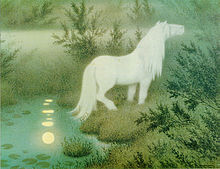


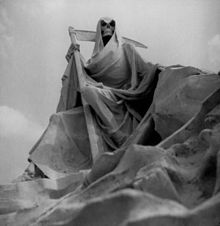

- I am quite content, in this Comedy of Appearances, to follow the old romancers' lead. "Such and such things were said and done by our great Manuel," they say to us, in effect: "such and such were the appearances, and do you make what you can of them."
I say that, too, with the addition that in real life, also, such is the fashion in which we are compelled to deal with all happenings and with all our fellows, whether they wear or lack the gaudy name of heroism.- "To Sinclair Lewis : A Foreword"
- They of Poictesme narrate that in the old days when miracles were as common as fruit pies, young Manuel was a swineherd, living modestly in attendance upon the miller's pigs. They tell also that Manuel was content enough: he knew not of the fate which was reserved for him.
- Ch. I : How Manuel Left the Mire
- He had a quiet way with the girls, and with the men a way of solemn, blinking simplicity which caused the more hasty in judgment to consider him a fool. Then, too, young Manuel was very often detected smiling sleepily over nothing, and his gravest care in life appeared to be that figure which Manuel had made out of marsh clay from the pool of Haranton.
This figure he was continually reshaping and realtering. The figure stood upon the margin of the pool; and near by were two stones overgrown with moss, and supporting a cross of old worm-eaten wood, which commemorated what had been done there.- Ch. I : How Manuel Left the Mire
- "Now I wonder what it is you find in that dark pool to keep you staring so?" the stranger asked, first of all.
"I do not very certainly know," replied Manuel "but mistily I seem to see drowned there the loves and the desires and the adventures I had when I wore another body than this. For the water of Haranton, I must tell you, is not like the water of other fountains, and curious dreams engender in this pool."- Ch. I : How Manuel Left the Mire
- I shall not ever return to you, my pigs, because, at worst, to die valorously is better than to sleep out one's youth in the sun. A man has but one life. It is his all. Therefore I now depart from you, my pigs, to win me a fine wife and much wealth and leisure wherein to discharge my geas. And when my geas is lifted I shall not come back to you, my pigs, but I shall travel everywhither, and into the last limits of earth, so that I may see the ends of this world and may judge them while my life endures. For after that, they say, I judge not, but am judged: and a man whose life has gone out of him, my pigs, is not even good bacon.
- Manuel, in Ch. I : How Manuel Left the Mire
- "Eh, Manuel, and will you re-model the world?"
"Who knows?" says Manuel, in the high pride of his youth. "At all events, I do not mean to leave it unaltered."- Naifer and Manuel, in Ch. II : Niafer
- You are now a famous champion, that has crowned with victory a righteous cause for which many stalwart knights and gallant gentlemen have made the supreme sacrifice, because they knew that in the end the right must conquer. Your success thus represents the working out of a great moral principle, and to explain the practical minutiae of these august processes is not always quite respectable.
- Miramon, in Ch. IV : In the Doubtful Palace
- I am not so wonderful but that in the hour of my triumph I am frightened by my own littleness. Look you, Niafer, I had thought I would be changed when I had become a famous champion, but for all that I stand posturing here with this long sword, and am master of the hour and of the future, I remain the boy that last Thursday was tending pigs.
- Miramon, in Ch. IV : In the Doubtful Palace
- I am Manuel, and I follow after my own thinking and my own desire. Of course it is very fine of me to be renouncing so much wealth and power for the sake of my wonderful dear Niafer: but she is worth the sacrifice, and, besides, she is witnessing all this magnanimity, and cannot well fail to be impressed.
- Miramon, in Ch. IV : In the Doubtful Palace
- The magician looked at the tall warrior for a while, and in the dark soft eyes of Miramon Lluagor was a queer sort of compassion. Miramon said, "Yes, Manuel, these portents have marked your living thus far, just as they formerly distinguished the beginnings of Mithras and of Huitzilopochtli and of Tammouz and of Heracles—"
"Yes, but what does it matter if these accidents did happen to me, Miramon?"
"— As they happened to Gautama and to Dionysos and to Krishna and to all other reputable Redeemers," Miramon continued.
"Well, well, all this is granted. But what, pray, am I to deduce from all this?"
Miramon told him.
Dom Manuel, at the end of Miramon's speaking, looked peculiarly solemn, and Manuel said: "I had thought the transformation surprising enough when King Ferdinand was turned into a saint, but this tops all! Either way, Miramon, you point out an obligation so tremendous that the less said about it, the wiser; and the sooner this obligation is discharged and the ritual fulfilled, the more comfortable it will be for everybody."- Ch. XXXII : The Redemption of Poictesme
- Manuel gave it up, and shrugged. Well, let us conquer as we may, so that God be on our side.
Miramon replied: "Never fear! He shall be, in every shape and attribute."- Manuel, in Ch. XXXII : The Redemption of Poictesme
- You, whom I made for man's worship when earth was younger and fairer, hearken, and learn why I breathe new life into husks from my scrap-heaps! Gods of old days, discrowned, disjected, and treated as rubbish, hark to the latest way of the folk whose fathers you succored! They have discarded you utterly.
- Miramon, in Ch. XXXII : The Redemption of Poictesme
- I shall never of my own free will expose the naked soul of Manuel to anybody. No, it would be no pleasant spectacle, I think: certainly, I have never looked at it, nor did I mean to. Perhaps, as you assert, some power which is stronger than I may some day tear all masks aside: but this will not be my fault, and I shall even then reserve the right to consider that stripping as a rather vulgar bit of tyranny.
- Manuel, in Ch. XXXIX : The Passing of Manuel
- I must tell you that in this moment all doubt as to my attested worth went out of me, who had redeemed a kingdom, and begotten a king, and created a god. So you waste time, my friend, in trying to convince me of all human life's failure and unimportance, for I am not in sympathy with this modern morbid pessimistic way of talking. It has a very ill sound, and nothing whatever is to be gained by it.
- Manuel, in Ch. XXXIX : The Passing of Manuel
- I am Manuel. I have lived in the loneliness which is common to all men, but the difference is that I have known it. Now it is necessary for me, as it is necessary for all men, to die in this same loneliness, and I know that there is no help for it.
- Manuel, in Ch. XXXIX : The Passing of Manuel
- I seem to see only the strivings of an ape reft of his tail, and grown rusty at climbing, who has reeled blunderingly from mystery to mystery, with pathetic makeshifts, not understanding anything, greedy in all desires, and always honeycombed with poltroonery. So in a secret place his youth was put away in exchange for a prize that was hardly worth the having; and the fine geas which his mother laid upon him was exchanged for the common geas of what seems expected.
- Manuel, in Ch. XXXIX : The Passing of Manuel
- "Now we must ford these shadowy waters," said Grandfather Death, "in part because your destiny is on the other side, and in part because by the contact of these waters all your memories will be washed away from you. And that is requisite to your destiny."
"But what is my destiny?"
"It is that of all loving creatures, Count Manuel. If you have been yourself you cannot reasonably be punished, but if you have been somebody else you will find that this is not permitted."
"That is a dark saying, only too well suited to this doubtful place, and I do not understand you."
"No," replied Grandfather Death, "but that does not matter."- Ch. XL : Colophon: Da Capo
- The stranger pointed at the unfinished, unsatisfying image which stood beside the pool of Haranton, wherein, they say, strange dreams engender....
"What is that thing?" the stranger was asking, yet again...
"It is the figure of a man," said Manuel, "which I have modeled and remodeled, and cannot get exactly to my liking. So it is necessary that I keep laboring at it, until the figure is to my thinking and my desire."- Ch. XL : Colophon: Da Capo
The Silver Stallion (1926)[edit]
- The Silver Stallion : A Comedy of Redemption · * Full text online at Project Gutenberg



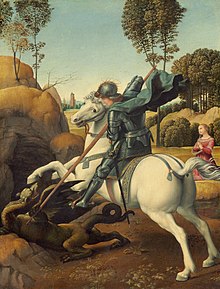


- Now, the redemption which we as yet await (continued Imlac), will be that of Kalki, who will come as a Silver Stallion: all evils and every sort of folly will perish at the coming of this Kalki: true righteousness will be restored, and the minds of men will be made as clear as crystal.
- Epigraph, based upon the style of Samuel Johnson in The History of Rasselas, Prince of Abissinia (1759), using a fictional reference to Imlac the philosopher in Johnson's tale.
- I agree with Freydis that, for various reasons, nobody ever, quite, knew Manuel well.
The hero of "The Silver Stallion" is, thus, no person, but an idea, — an idea presented at the moment of its conception... I mean, of course, the idea that Manuel, who was yesterday the physical Redeemer of Poictesme, will by and by return as his people's spiritual Redeemer.- Author's Note
- Each in his day, and within howsoever limited a circle of adherents, awakened that sustaining faith which appears vitally necessary to men's contentment, in the legend of the all powerful Redeemer who will come again, to-morrow.
The theme of this book, then, is how that legend came to attach itself to Dom Manuel; how, in particular, that legend afterward affected, or did not affect, those persons who had known Dom Manuel almost intimately; and how in the end nobody believed in it any longer except Donander Veratyr. But Donander Veratyr was God.- Author's Note
- I am content. While my shrewd fellows rode about the world to seek and to attain power and wisdom, I have elected, as and unpractical realist, to follow after beauty.
- Gonfal, in Book Two : The Mathematics of Gonfal, Ch. X : Relative to Gonfal's Head
- There is no gift more great than love.
- Morvyth, in Book Two : The Mathematics of Gonfal, Ch. X : Relative to Gonfal's Head
- I must, here again, in mere honesty, I must distinguish. I mean that I think you know, as well as I do, love is not a gift which any man can give nor any person hope long to retain. Ah, no, madame! we shrug, we smilingly allow romanticists their catchwords: meanwhile it remains the veriest axiom, among realists like you and me, that love too is but a loan.
- Gonfal, in Book Two : The Mathematics of Gonfal, Ch. X : Relative to Gonfal's Head
- In religious matters a traveller loses nothing by civility.
- Coth, in Book Four : Coth at Porutsa, Ch. XX : Idolatry of an Alderman
- Man alone of animals plays the ape to his dreams.
- Manuel, in Book Four : Coth at Porutsa, Ch. XXV : Last Obligation upon Manuel
- I have followed after the truth, across this windy planet upon which every person is nourished by one or another lie.
- Coth, in Book Four : Coth at Porutsa, Ch. XXVI : The Realist in Defeat
- "… The famousness of Manuel is but a dream and a loud jingling of words which happen to sound well together; it is a vanity and a great talking by his old wife and gray peers; and yet, this nonsense, it may be, will hearten people, and will serve all people always, better than would the truth. And my faith is a foolishness, in that, because of a mere oath, — like your Star Warriors' Word of the Thingumajigs, sir, — I have followed after the truth, across this windy planet upon which every person is nourished by one or another lie."
"Each to his creed," said Yaotl. "So do men choose between hope and despair."
"Yet creeds mean very little," Coth answered the dark god, still speaking almost gently. "The optimist proclaims that we live in the best of all possible worlds; and the pessimist fears this is true. So I elect for neither label. …"- Coth, in Book Four : Coth at Porutsa, Ch. XXVI : The Realist in Defeat
- Everywhere in the world people were expecting the latter coming of one or another kickshaw messiah who would remove the discomforts which they themselves were either too lazy or too incompetent to deal with; and nobody had anything whatever to gain with electing for peculiarity among one's fellow creatures and a gloomier outlook.
Even Coth saw that.- Book Five : "Mundus Vult Decepi", Ch. XXVII : Fond Motto of a Patriot
- These young people were getting a calm and temperate, but a positive, gratification out of being virtuous. There must, then, lurk somewhere deep hidden in humanity a certain trend to perverse delight in thus denying and curbing its own human appetites. And since the comparatively intelligent and unregenerate persons were all profiting by their fellows' increased forbearance, altogether everybody was reaping benefit.
This damnable new generation was, because of its insane aspiring, happier than its fathers had been under the reign of candor and common sense.- Book Five : "Mundus Vult Decepi", Ch. XXIX : The Grumbler's Progress
- Coth admitted that, say what you might as to the Manuel who had really lived, the squinting rascal did as a rule know what he was talking about.
- Book Five : "Mundus Vult Decepi", Ch. XXIX : The Grumbler's Progress
- Is it not a pity, Guivric, that this Kalki will not come in our day, and that we shall never behold his complete glory? I cry a lament for that Kalki who will someday bring back to their appointed places high faith and very ardent loves and hatreds; and who will see to it that human passions are in never so poor a way to find expressions in adequate speech and action. Ohé, I cry a loud lament for Kalki! The little silver effigies which his postulants fashion and adore are well enough: but Kalki is a horse of another color.
- Horvendille, in Book Six : In the Sylan's House, Ch. XXXIX : One Warden Left Uncircumvented
- I consider the saga of no lord of the Silver Stallion to be worth squabbling over. Your sagas in the end must all be perverted and engulfed by the great legend about Manuel. No matter how you strive against that legend, it will conquer: no matter what you may do or suffer, my doomed Guivric, your saga will be recast until it conforms in everything to the legend begotten by the terrified imaginings of a lost child. For men dare not face the universe with no better backing than their own resources; all men that live, and that go perforce about this world like blundering lost children whose rescuer is not yet in sight, have a vital need to believe in this sustaining legend about the Redeemer: and the wickedness and the foolishness of no man can avail against the fond optimism of mankind.
- Horvendille, in Book Six : In the Sylan's House, Ch. XXXIX : One Warden Left Uncircumvented
- This is a strong magic.This is a sententious magic. They had warned me that I would here face my own destruction, that I would here face the most pitiable and terrible of all things: and I face here that which I have made of life, and life of me. I shudder; I am conscious of every appropriate sentiment. Nevertheless, sir, I must venture the suggestion that mere, explicit allegory as a form of art is somewhat obsolete.
- Guivric, in Book Six : In the Sylan's House, Ch. XL : Economics of Glaum-Without-Bones
- They tell me that truth lies somewhere at the bottom of a well, and at virtually the door of our home is a most notable if long dried well. Our location is thus quite favorable, if we but keep patience.
- Kerin, in Book Seven : What Saraïde Wanted, Ch. XLII : Generalities at Ogde
- Life is very marvelous ... and to the wonders of the earth there is no end appointed.
- The Gander, in Book Seven : What Saraïde Wanted, Ch. XLV : The Gander Also Generalizes
- I do not seek to copy nature. I, on the contrary, create to divert me such faith and dreams as living among men would tend to destroy. But as it is, my worshipers depart from me heartedly, in this grey corridor, and they are devoid of fear and parvanimity; for the effect of my singing, like that of all great singing, is to fill my hearers with a sentiment of their importance as moral beings and the greatness of their destinies.
- The Gander, in Book Seven : What Saraïde Wanted, Ch. XLV : The Gander Also Generalizes
- Nothing ... nothing in the universe, is of any importance, or is authentic to any serious sense, except the illusions of romance. For man alone of animals plays the ape to his dreams. These axioms — poor, deaf and blinded spendthrift! — are none the less valuable for being quoted.
- The Gander, in Book Seven : What Saraïde Wanted, Ch. XLV : The Gander Also Generalizes
- Life is a pageant that passes very quickly, going hastily from one darkness to another darkness with only ignes fatui to guide; and there is no sense in it. I learned that, Kerin, without moiling over books. But life is a fine ardent spectacle; and I have loved the actors in it: and I have loved their youth and high-heartedness, and their ungrounded faiths, and their queer dreams, my Kerin, about their own importance and about the greatness of the destiny that awaited them, — while you were piddling after, of all things, the truth!
- Saraïde, in Book Seven : What Saraïde Wanted, Ch. XLVII : Economics of Saraïde
- People must have both their dreams and their dinners in this world, and when we go out of it we must take what we find. That is all.
- Niafer, in Book Ten : At Manuel's Tomb, Ch. LXIX : Economics of Jurgen
The Way of Ecben (1929)[edit]


- The Way of Ecben : A Comedietta Involving a Gentleman (1929); later published in The Witch-Woman : A Trilogy about Her (1948)
- At the gate of the garden, beside the lingham post which stood there in eternal erection, sat a boy who was diverting himself by whittling, with a small green-handled knife, a bit of cedar-wood into the quaint shaping which the post had. His hair was darkly red: and now, as he regarded Alfgar with brown and wide-set eyes, the face of this boy was humorously grave, and he nodded now, as the complacent artist nods who looks upon his advancing work and finds all to be near his wishes.
- Ch. 13 : What a Boy Thought
- I do that which I do in every place. Here also, at the gateway of that garden into which time has not entered, I fight with time my ever-losing battle, because to do that diverts me.
- Horvendile, in Ch. 13 : What a Boy Thought
- I fight against the gluttony of time with so many very amusing weapons — with gestures and with three attitudes and with charming phrases; with tears and with tinsel, and with sugar-coated pills, and with platitudes slightly regilded. Yes, and I fight him also with little mirrors wherein gleam confusedly the corruptions of lust, and ruddy loyalty, and a bit of moonshine, and the pure diamond of the heart's desire, and the opal cloudings of human compromise: but, above all, I fight that ravening dotard with the strength of my own folly.
- Horvendile, in Ch. 13 : What a Boy Thought
- I take it that I must be the eternal playfellow of time. For piety and common-sense and death are rightfully time's toys; and it is with these three that I divert myself.
- Horvendile, in Ch. 13 : What a Boy Thought
- My immortality has sharp restrictions. For it is at a price that I pass down the years, as yet, in eternal union with the witch-woman whose magic stays — as yet — more strong than the magic of time. The price is that I only of her lovers many not ever hope to win Ettare. This merely is permitted me: that I may touch the hand of Etarre in the moment I lay that hand in the hand of her last lover. I give, who may not ever take... So do I purchase an eternally unfed desire against which time — as yet — remains powerless.
- Horvendile, in Ch. 13 : What a Boy Thought
Quotes about Cabell[edit]

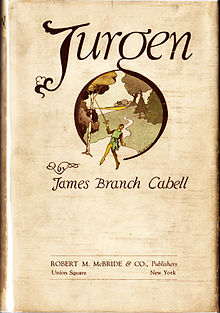









- A strange thing happened to the American fantasy author James Branch Cabell in 1920. Cabell was a writer of novels, short stories and poetry who'd been published regularly for about twenty years to great critical acclaim (fans included Mark Twain, Sinclair Lewis and H. L. Mencken) but no commercial success whatsoever. The previous year, his latest mediaeval fantasy novel, Jurgen: A Comedy of Justice, had been published to the usual glowing reviews and public indifference, and appeared destined for the same obscurity as the rest of his work.
Then the New York Society for the Suppression of Vice, under John S. Sumner, brought an action against the novel for obscenity. The case went to court, amid considerable publicity – one side dedicated to protecting outraged public morals, the other championing the author as a martyr to the philistines – and dragged on for two years, at the end of which Cabell and his publishers were fully vindicated.
The result was inevitable: Jurgen became a huge bestseller, and for several years everything Cabell wrote was a commercial success.- Nyki Blatchley, in a review of Jurgen: A Comedy of Justice at Fantasy-Fiction (5 December 2011)
- Cabell's humour is complex and many layered, ranging from erudite jokes to evasion to broad satire to double entendres (“Why, I travel with a staff, my dear, as you perceive; and it suffices me.” “Certainly it is large enough, in all conscience.”). ... Cabell's portrayal of Hell and Heaven (which Jurgen visits in that order) is perhaps the cleverest part of the book, and caused him considerable trouble – his attitude to religion offended Sumner and co. as much as his oblique portrayals of sex. Both are, essentially, fakes, created by Koshchei at the insistence of Jurgen's own forebears and using the Bible as his model. However, “whatever Koshchei wills, not only happens, but has already happened beyond the ancientest memory of man and his mother. How otherwise could he be Koshchei?” So, despite being fakes, the Heaven and Hell of the Bible are also true, and always have been.
The two things, we are told, that are impossible for Koshchei are love and pride, and his fascination with these two realms is that they are based on these two emotions: Heaven on the love that creates ideal versions of what is very far from ideal, Hell on the pride that demands petty sins and crimes as worthy of being recognised and punished. Neil Gaiman's Sandman graphic novels, which include a few Cabellian references, adopt this image of Hell, while being silent on the nature of Heaven.- Nyki Blatchley, in a review of Jurgen: A Comedy of Justice at Fantasy-Fiction (5 December 2011)
- Cabell brought many new elements into the modern fantasy tradition, from his romantic poeticism to his ironic comedy; but perhaps the most impressive is the way his stories interact with one another. Each book stands quite comfortably alone, but the more Cabell you read, the more you understand. ... Jurgen has a curious conversation with a young man named Horvendile, who speculates that maybe he himself is the author of all that is happening. Horvendile's appearance here is only fleeting, but he recurs in a great many of Cabell's books, unchanged whatever the period, and does seem to exert a great deal of control over events. In The Cream of the Jest, however, we discover that Horvendile is actually the dream-self of the twentieth-century author, Felix Kennaston of Lichfield, who writes tales of mediaeval Poictesme and who wanders time as Horvendile, controlling all the characters he's created.
So all these stories are really the creations of Kennaston – a figure not entirely unlike Cabell himself? Not quite. In the genealogical work that links all the characters together, Cabell makes it quite clear that Felix Kennaston is actually a descendant of both Jurgen and Manuel – whom he consequently couldn't possibly have invented.
All Cabell's writings work like this, almost as if he were creating an intricate Chinese puzzle, and the wealth of connections between the books somewhat foreshadow later authors, such as Michael Moorcock, who also weave many separate books into a grand design. ... The female characters in Cabell's books are, almost without exception, either romantic beauties or nags – if not both at the same time – and they have no real substance in the stories beyond how they relate to the male characters. This can certainly be off-putting; but, if the reader can read the books as a product of their time and ignore these short-comings, there's plenty of reward. With that caveat, I heartily recommend Jurgen, along with the other books mentioned here.
Oh, and what of those obscenities that caused John S. Sumner a near apoplexy? Well, I don't doubt you can find them, if you dig deep and approach Jurgen with plenty of humour and imagination, as well as being willing to look up various of Cabell's obscure references. Just don't expect Lady Chatterley’s Lover.- Nyki Blatchley, in a review of Jurgen: A Comedy of Justice at Fantasy-Fiction (5 December 2011)
- James Branch Cabell totally ripped off Neil Gaiman!
- "JBC" at the James Randi Educational Foundation (29 January 2009)
- The only American author of genius to devote his career to fantasy.
- There is an outcry against epoch-making masterpieces of philosophy like Jurgen. The salacious musical comedy goes its libidinous way rejoicing, while Ibsen and Bernard Shaw are on the black list. The fact is, of course, that the puritan has been turned by sexual repression into a sexual pervert and degenerate, so that he is insane on the subject.
- Aleister Crowley, in The Confessions of Aleister Crowley (1929)
- In the early part of the 20th century, there was a fantasy writer named James Branch Cabell who had a theory of writing as magic. His books (highly recommended, especially Jurgen) are both funny and mythological ... and it's easy to see how his process of creating characters was really a process of evocation and invocation.
- Actually, my favorite treatment of bad reviews is James Branch Cabell who, in the back of the 18 volume beautiful, huge collection of all of his works the Biography of Manuel, did a final section detailing what the reviewers said for each of his books. The book reviews go like this. The first 5 or 6 books, the reviews he quotes say something like: "Beautiful illustrations by the artist; such a pity about the words." Then you get to the reviews of Jurgen: A Comedy of Justice and the reviews say: "This a terrible book. It has no redeeming features; it's simply awful; a major misstep." And then every single review for every book he wrote after Jurgen begins, "Well, this isn't Jurgen. Apparently the author has lost the facility with which he wrote that delightful book." So he did put this wonderful parade of the ridiculous things that the reviewers said over time. As I mentioned in the blog, the only final thing that you can say about the reviewers, is this. The same day that the Publisher's Weekly review came in which said, "The road trip plot was completely aimless, but I liked the stuff in Lakeside," the Summer Book Forum book review came in which said, "The roadside stuff is amazing -- the novel only loses focus when you get to the stuff in Lakeside." ... If you actually pay any credence to it, it does make you crazy. So you just kind of smile and think, "Maybe someday I'll review all the reviewers someday." But you probably won't.
- Neil Gaiman, in "Interview With Neil Gaiman" by Claire E. White, at Writers Write (2001)
- The Silver Stallion, Jurgen, The High Place: Eighteen volumes of beautiful, worldly-wise writing by a forgotten American master. The books aren't all in print, and they range all over genre (including poetry and literary criticism). Of the fantasies, The Silver Stallion, Jurgen, and The High Place are three of the most notable, each book different but united in their sly wisdom.
- Neil Gaiman, on The Biography of Manuel in "Neil Gaiman's 10 Mythic Fantasy Books to Read"
- Cabell's far and away my favourite forgotten American writer — he wrote about 25 books, most of them very different from each other. The only ones to have remained more or less in print over the last forty years are the fantasies Figures of Earth, Jurgen and The Silver Stallion.
- I think that unless a reviewer gets their facts completely wrong, the author should shut up (and even then, the author should probably let it go — although I'm a big fan of a letter that James Branch Cabell wrote to the New York Times pointing out that their review of Figures of Earth was bollocks. ... For most authors, not being James Branch Cabell, it's probably wisest after reading a particularly stupid or vicious or bad review to mentally compose your letter to the editor, fill it with your sharpest and most cutting and brilliant bon mots, and then, having made it up, to successfully resist the urge to put it to paper, and to return cheerfully to work.
- Among the literary men of the time, Cabell's circle of friends was large: Sinclair Lewis, Joseph Hergesheimer, Carl Van Vechten, Burton Rascoe, Arthur Machen, to name a few. In his Nobel Prize Address in 1930, Lewis mentioned Cabell as one of the three American writers, along with Hemingway and Faulkner, worthy of the attention of the Swedish Academy. All in all, Cabell's reputation in the 20's must have seemed unassailable. But fortune's wheel turned, and the years that followed his initial popularity gave rise to a series of hostile critics.
Cabell's novels were attacked from almost every conceivable position: stylistically, ideologically, socially, personally. In 1933, Granville Hicks, abdicating the critic's responsibility of balanced judgment, strikes at the author himself, calling him "a sleek, smug egoist," and his work "a structure of lies." Hicks begins the series of attacks; and Oscar Cargill in Intellectual America (1941), after damning "Cabell's reputation as a stylist" as "overblown," attempts to have the final word. He sums Cabell up "as a museum piece representing the psychology of a Virginian who would be an intellectual leader yet had not quite what it takes."
However, the 1950's had better words for Cabell. Edward Wagenknecht in the Cavalcade of the American Novel (1952) reminds us that "James Branch Cabell …is still a unique and incomparable figure in American literature … He will never be the voice of a 'party' or of a 'movement'; he will never speak for anything smaller or more limited than the human spirit itself." Four years later, Edmund Wilson in a long article in the New Yorker suggested that Cabell's work had been maligned by partial critics and called for a reevaluation of his novels. In the 60's two book-length studies have appeared, and a biography is in preparation. Joe Lee Davis concludes that "one must — in common decency and simple justice — rank him among the major rather than the minor authors of the twentieth century... . Cabell is both the Spenser and the Boccaccio of the second American Renaissance." After years of neglect, Cabell's work is again receiving the attention it deserves.- William L. Godshalk, in "James Branch Cabell at William and Mary: the Education of a Novelist," in The William and Mary Review, 5 (1967); reprinted in Kalki, Vol II, No.4, Whole No.8 (1968), and In Quest of Cabell : Five Exploratory Essays (1975), by William L. Godshalk
- Torn between the ideal and the real, Cabellian man is forever thwarted in his quest for the ideal by the demands of the real. Cabell explores all the aspects of this human dilemma, perhaps reaching the conclusion that man can never achieve his ideals, simply because he must exist in the world of reality; and yet, for his self-preservation in that world he must, paradoxically, cling to these very ideals, unrealized, unrealizable. Even in the face of materialistic denial of spiritual value, man must believe in some kind of transcendent worth.
Although the meaning of Cabellian comedy can be comprehended without the ability to recognize each learned allusion, the incidents of the novels are often based on classical, Russian, Hebrew, medieval, and even Aztec myths and legends. The reader is quite obviously in the presence of a learned author, and many of Cabell's intellectual pursuits can be traced to his college years.- William L. Godshalk, in "James Branch Cabell at William and Mary: the Education of a Novelist," in The William and Mary Review, 5 (1967)
- We may list Fitzgerald as one of the sources of Cabell's cosmic skepticism. As important as the source, however, is the attitude evinced. In his late teens, Cabell is beginning to feel the same tension between real and ideal apparent in his later novels. Man feels that it is "not fitting" (Jurgen would say "not just") that he should be trapped in a completely material world of "Raiment, Food and Fire," and yet, at the same time, he realizes the futility of seeking after "Knowledge" of "higher things." In this tension between real and ideal, man must somehow make the best of an infinitely poor situation.
- William L. Godshalk, in "James Branch Cabell at William and Mary: the Education of a Novelist," in The William and Mary Review, 5 (1967)
- A Cabellesque satire on religion and sex.
- Robert A. Heinlein, describing his novel Stranger in a Strange Land (1961), in a letter to Lurton Blassingame (21 October 1960) as published in Grumbles from the Grave (1989), p. 228
- Cabell and Hitler did not inhabit the same universe.
- Alfred Kazin, in On Native Grounds : An Interpretation of Modern American Prose Literature (1941), p. 231
- A book of dreams it is, and of very wonderful dreams.
- A curious, singular and enchanting book. I have read it with admiration and delight.
- Arthur Machen, on The Cream of the Jest
- Surely the cosmic irony that loves men's dullness because it alone can preserve them from madness, and retorts upon the cosmic terrors with a jest, is higher than gallantry and more enduring. It arrives at tolerance for all human shortcomings; it embraces high and low in its sympathies; it achieves urbanity as a final goal. It is the stuff of which great literature is made. And Mr. Cabell is creating great literature. A self-reliant intellectual, rich in the spoils of all literatures, one of the great masters of English prose, the supreme comic spirit thus far granted us, he stands apart from the throng of lesser American novelists, as Mark Twain stood apart, individual and incomparable.
- Vernon Louis Parrington, in The Pacific Review (December 1921), later published in Main Currents in American Thought (1927)
- Cabell's Biography of Manuel had been structured as parallel examinations of three contrasting modes of life, the Way of the Artist, the Way of Chivalry, and the Way of Gallantry. Cabell's personal "picture" of gallantry is said to have derived from the phony chivalry of late 19th century Virginians, which he imbibed with his mother's milk, his family being respectably connected to the upper crust of Virginian aristocracy. ... The models he cites, however, are the gallants of Restoration Comedy ... Mark Twain, fascinated by the chivalric ideal, was quite taken with Cabell's writings on the subject. His encouragement directed to Cabell resulted in Domnei, published in 1911 as The Soul of Melicent. ... in both The Silver Stallion and in his explications, Cabell conceptualizes the progressive vitiation of the Life as a matter of the blurring of the realities of person and place by the remove of time and the world's will to be deceived, and the work of the cosmic Romancer.
- It is true, of course, that like the fruit of the tree of life, Mr. Cabell's artistic progeny sprang from a first conceptual germ — "In the beginning was the Word." That animating idea is the assumption that if life may be said to have an aim it must be an aim to terminate in success and splendor. It postulates the high, fine importance of excess, the choice or discovery of an overwhelming impulse in life and a conscientious dedication to its fullest realization. It is the quality and intensity of the dream only which raises men above the biological norm; and it is fidelity to the dream which differentiates the exceptional figure, the man of heroic stature, from the muddling, aimless mediocrities about him. What the dream is, matters not at all — it may be a dream of sainthood, kingship, love, art, asceticism or sensual pleasure — so long as it is fully expressed with all the resources of self. It is this sort of completion which Mr. Cabell has elected to depict in all his work: the complete sensualist in Demetrios, the complete phrase-maker in Felix Kennaston, the complete poet in Marlowe, the complete lover in Perion. In each he has shown that this complete self-expression is achieved at the expense of all other possible selves, and that herein lies the tragedy of the ideal. Perfection is a costly flower and is cultured only by an uncompromising, strict husbandry.
- Burton Rascoe, in the Introduction to Chivalry (1921) by James Branch Cabell, later published in Prometheans : Ancient and Modern (1933), p. 279
- Once we understand the fundamentals of Mr. Cabell's artistic aims, it is not easy to escape the fact that in Figures of Earth he undertook the staggering and almost unsuspected task of rewriting humanity's sacred books, just as in Jurgen he gave us a stupendous analogue of the ceaseless quest for beauty. For we must accept the truth that Mr. Cabell is not a novelist at all in the common acceptance of the term, but a historian of the human soul. His books are neither documentary nor representational; his characters are symbols of human desires and motives. By the not at all simple process of recording faithfully the projections of his rich and varied imagination, he has written thirteen books, which he accurately terms biography, wherein is the bitter-sweet truth about human life.
- Burton Rascoe, in the Introduction to Chivalry (1921) by James Branch Cabell, later published in Prometheans : Ancient and Modern (1933), p. 279
- The Cabell novels are ordinarily anything but grim. He is essentially a comic writer, and those who have placed him in the lineage of Boccaccio, Rabelais, Petronious Arbiter, Laurence Sterne are generally correct. Mr. Cabell is amused by the world; his novels are constructed upon that amusement. If the laughter seems sardonic sometimes, when the absurdities of his people seem only too recognizable to us, then we must remember that Mr. Cabell considers that amusing too.
- Louis Decimus Rubin, Jr, in "Two in Richmaond: Ellen Glascow and James Branch Cabell" in The Curious Death of the Novel: Essays in American Literature (1967), p . 176
- I have finished Jurgen; a great and beautiful book, and the saddest book I ever read. I don't know why, exactly. The book hurts me — tears me to small pieces — but somehow it sets me free. It says the word that I've been trying to pronounce for so long. It tells me everything I am, and have been, and may be, unsparingly... I don't know why I cry over it so much. It's too — something-or-other — to stand. I've been sitting here tonight, reading it aloud, with the tears streaming down my face...
- Deems Taylor, in a letter to Mary Kennedy (12 December 1920)
- Mr. Cabell has a profound creed of comedy rooted in that romance which is his regular habit. ... only gradually did his gaiety strengthen into irony. Although that irony was the progenitor of the comic spirit which now in his maturity dominates him, it has never shaken off the romantic elements which originally nourished it. Rather, romance and irony have grown up in his work side by side. ... He allows John Charteris in Beyond Life — for the most part Mr. Cabell's mouthpiece — to set forth the doctrine that romance is the real demiurge, "the first and loveliest daughter of human vanity," whereby mankind is duped — and exalted.
- Carl Clinton Van Doren, in Contemporary American Novelists, 1900-1920 (1922)
- Poor and naked as this aspiring ape must seem to the eye of reason, asks Mr. Cabell, is there not something magnificent about his imaginings? Does the course of human life not singularly resemble the dance of puppets in the hands of a Supreme Romancer? How, then, may any one declare that romance has become antiquated or can ever cease to be indispensable to mortal character and mortal interest? The difference between Mr. Cabell and the popular romancers who in all ages clutter the scene and for whom he has nothing but amused contempt is that they are unconscious dupes of the demiurge whereas he, aware of its ways and its devices, employs it almost as if it were some hippogriff bridled by him in Elysian pastures and respectfully entertained in a snug Virginian stable.
- Carl Clinton Van Doren, in Contemporary American Novelists, 1900-1920 (1922)
- Of all the fine places in the world where beautiful happenings come together, Mr. Cabell argues, incomparably the richest is in the consciousness of a poet who is also a scholar. There are to be found the precious hoarded memories of some thousands of years: high deeds and burning loves and eloquent words and surpassing tears and laughter. There, consequently, the romancer may well take his stand, distilling bright new dreams out of ancient beauty. And if he adds the heady tonic of an irony springing from a critical intelligence, so much the better.
- Carl Clinton Van Doren, in Contemporary American Novelists, 1900-1920 (1922)
- If the poets and warriors who make up the list of Mr. Cabell's heroes devote their lives almost wholly to love, it is for the reason that no other emotion interests him so much or seems to him to furnish so many beautiful happenings about which to write perfectly. Love, like art, is a species of creation, and the moods which attend it, though illusions, are miracles none the less. ... In this tale love is canonized: throned on alabaster above all the vulgar gods it diffuses among its worshipers a crystal radiance in which mortal imperfections perish — or are at least forgotten during certain rapturous hours. Ordinarily one cynical touch will break such pretty bubbles; but Mr. Cabell, himself a master of cynical touches and shrewdly anticipant of them, protects his invention with the competent armor of irony...
- Carl Clinton Van Doren, in Contemporary American Novelists, 1900-1920 (1922)
- I had not been two weeks in the United States before someone said to me: "Well, at any rate, there is Cabell." That was a new name to me. I was given Beyond Life to read. My excitement during the discovery of that perverse and eloquent testament was one of the happiest moments of my American stay. I spent then a wild and eccentric search after his earlier masterpieces. Inside the cover of Beyond Life there were the titles of no less than fourteen books. I could see from the one which I held in my hand that Mr. Cabell was no careless writer. He had been writing then for many years and he was unobtainable! "No, he has never had any success," a bookseller told me. "No one ever asks for his books."
That situation is now changed. There are, I imagine, a great many more persons in the United States of America asking for Jurgen than are likely to obtain it. That good, at any rate, an idiotic censorship has done.- Hugh Walpole, in The Art of James Branch Cabell (1920)
- I am amazed that this remarkable and original talent has been at America's service for nearly twenty years, its patient waiting entirely unrewarded whether by the public or the critics or even the superior cranks.
Let it be said at once that Cabell's art will always be a sign for hostilities. Not only will he remain, in all probability, forever alien to the general public, but he will also, I suspect, be to the end of time a cause for division among cultivated and experienced readers. His style is also at once a battleground. It is the easiest thing in the world to denounce it as affected, perverse, unnatural, and forced. It would be at once an artificial style were it not entirely natural to the man.- Hugh Walpole, in The Art of James Branch Cabell (1920)
- Ideal Beauty, Ideal Love, and a Dream World belong to the romanticist. And it is through his concepts of these terms and the exercise of his talents with them that James Branch Cabell overtops to-day all other romantic writers in America.
To watch his progress, to trace it through his works, is to observe how he cast off shackle after shackle of limitation, to ultimate unhampered movement over the earth, in the zenith that is Heaven or the pit that is Hell.- Blanche Colton Williams, in Our Short Story Writers (1920)
- I believe, that certain people — especially, perhaps, in Britain — have a lifelong appetite for juvenile trash. ... You can see it in the tone they fall into when they talk about Tolkien in print: they bubble, they squeal, they coo; they go on about Malory and Spenser — both of whom have a charm and a distinction that Tolkien has never touched.
As for me, if we must read about imaginary kingdoms, give me James Branch Cabell's Poictesme. He at least writes for grown-up people, and he does not present the drama of life as a showdown between Good People and Goblins. He can cover more ground in an episode that lasts only three pages than Tolkien is able to in one of this twenty-page chapters, and he can create a more disquieting impression by a reference to something that is never described than Tolkien through his whole demonology.- Edmund Wilson, in "Oo, Those Awful Orcs!" : A review of The Fellowship of the Ring, The Nation (14 April 1956)
- The more I have thought about Figures of Earth — and its sequel The Silver Stallion — the more remarkable they have come to seem. Looking back, one can now understand the abrupt fluctuations of Cabell's fame. ... Published when Cabell was forty-two, the chronicle of Manuel the Redeemer was not a book for the Young nor was it a book in the mood of the twenties. The story of the ambitious man of action who is cowardly, malignant and treacherous and who does not even enjoy very much what his crimes and double-dealing have won him, but who is rapidly, after his death, transformed into a great leader, a public benefactor and a saint, has the fatal disadvantage for a novel that the reader finds no inducement to identify himself with its central figure. Yet I am now not sure that this merciless chronicle in which all the values are negative except the naked human will, is not one of the best things of its kind in literature — on a plane, perhaps, with Flaubert and Swift.
- Edmund Wilson, in "James Branch Cabell 1897 - 1958" (1958), later published in The Bit Between My Teeth: A Literary Chronicle Of 1950-1965 (1966), p. 322
- Cabell certainly doesn't take himself too seriously.
I enjoyed Figures of Earth a lot; its humour was so enjoyably sophisticated that I had to check that the author really was an American :-).
External links[edit]
- James Branch Cabell - Literary Life and Legacy
- The Silver Stallion: The James Branch Cabell Website
- Mundus Vult Decepi - JBC Tribute site
- James Branch Cabell Library
- Profile at Fantastic Fiction
- Bibliography at the Internet Science-Fiction Database
- Works by James Branch Cabell at Project Gutenberg
- Jurgen: A Comedy of Justice online at University of Virginia
- The Cream of The Jest online at University of Wisconsin
- Domnei - online at Litrix Reading Room
- Chronology of the life of James Branch Cabell
- James Branch Cabell page
- James Branch Cabell's Influence on Robert A. Heinlein

